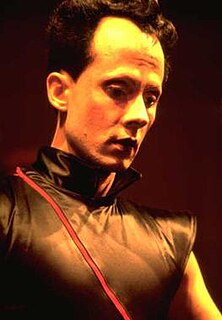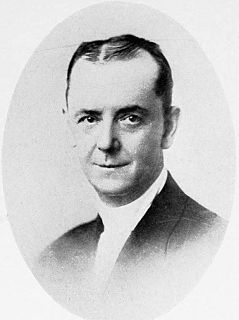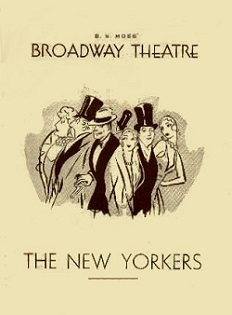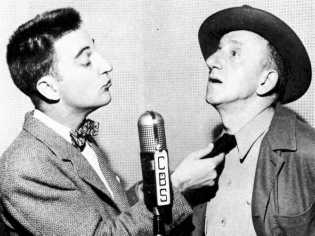
The Original Dixieland Jass Band (ODJB) was a Dixieland jazz band that made the first jazz recordings in early 1917. Their "Livery Stable Blues" became the first jazz record ever issued. The group composed and recorded many jazz standards, the most famous being "Tiger Rag". In late 1917 the spelling of the band's name was changed to Original Dixieland Jazz Band.

James Francis Durante was an American actor, comedian, singer, vaudevillian, and pianist. His distinctive gravelly speech, Lower East Side accent, comic language-butchery, jazz-influenced songs, and prominent nose helped make him one of America's most familiar and popular personalities of the 1920s through the 1970s. He often referred to his nose as the schnozzola, and the word became his nickname.

Klaus Sperber, known professionally as Klaus Nomi, was a German countertenor noted for his wide vocal range and an unusual, otherworldly stage persona.

Gustave Edwards was an American songwriter and vaudevillian. He also organised his own theatre companies and was a music publisher.

Edwin Fitzgerald, known professionally as Eddie Foy and Eddie Foy Sr., was an American actor, comedian, dancer and vaudevillian.

George Albert "Georgie" Jessel was an American, actor, singer, songwriter, film producer, and illustrated song "model." He was famous in his lifetime as a multitalented comedic entertainer, achieving a level of recognition that transcended his limited roles in movies. He was widely known by his nickname, the "Toastmaster General of the United States," for his frequent role as the master of ceremonies at political and entertainment gatherings. Jessel originated the title role in the stage production of The Jazz Singer.

The Palace Theatre is a Broadway theatre located at 1564 Broadway in midtown Manhattan, New York City. From 1913 through about 1929, the Palace attained legendary status among vaudeville performers as the flagship of the Keith–Albee organization, and the most desired booking in the country. With 1,610 seats spread over three levels, it is one of the largest theaters on Broadway, housing primarily large musicals and concert engagements. On September 16, 2018, following the run of SpongeBob SquarePants, the theater closed for an extensive renovation, and is expected to reopen in 2021.

Robert Sage Wilber was an American jazz clarinetist, saxophonist, and band leader. Although his scope covers a wide range of jazz, Wilber was a dedicated advocate of classic styles, working throughout his career to present traditional jazz pieces in a contemporary manner. He played with many distinguished jazz leaders in the 1950s and 1960s, including Bobby Hackett, Benny Goodman, Sidney Bechet, Jack Teagarden and Eddie Condon. In the late 1960s, he was an original member of the World's Greatest Jazz Band, and in the early 70s of Soprano Summit, a band which gained wide attention. In the late 1970s, he formed the Bechet Legacy Band.

The Rhythm Boys were an American male singing trio consisting of Bing Crosby, Harry Barris and Al Rinker. Crosby and Rinker began performing together in 1925 and were recruited by Paul Whiteman in late 1926. Pianist/singer/songwriter Barris joined the team in 1927. They made a number of recordings with the Whiteman Orchestra and released singles in their own right with Barris on piano. They appeared with the Whiteman orchestra in the film King of Jazz, in which they sang "Mississippi Mud", "So the Bluebirds and the Blackbirds Got Together", "A Bench in the Park", and "Happy Feet". They are best remembered for launching Crosby's solo career, one that would make him the greatest song charting act in history and one of the most influential entertainers of the twentieth century.

The New Yorkers is a musical written by Cole Porter and Herbert Fields (book). Star Jimmy Durante also wrote the words and music for the songs in which his character was featured.

Edith Wilson was a blues singer, vaudeville performer, and actress from Louisville, Kentucky, US. An African-American who performed and recorded in the classic female blues style in the 1920s, Wilson worked in vaudeville and stage productions, first in Louisville and later throughout the US and abroad. From the 1930s onward, she acted in radio plays and television, and from 1948 to 1966 represented the Aunt Jemima brand for Quaker Oats in personal appearances and on television. She remained an active performer until 1980.

Broadway to Hollywood is a 1933 American pre-Code musical film directed by Willard Mack, produced by Harry Rapf, cinematography by Norbert Brodine and released by Metro-Goldwyn-Mayer. The film features many of MGM's stars of the time, including Frank Morgan, Alice Brady, May Robson, Madge Evans, Jimmy Durante, Mickey Rooney, and Jackie Cooper. Brothers Moe Howard and Curly Howard of The Three Stooges appear—without Ted Healy and without Larry Fine—almost unrecognizably, as Otto and Fritz, two clowns in makeup. It was the first film to feature Nelson Eddy.
Roadhouse Nights is a 1930 American Pre-Code gangster film. A number of sources including Sally Cline in her book Dashiell Hammett Man of Mystery claim it is based on the classic novel Red Harvest written by Dashiell Hammett. However the credits of the film itself say only "An Original Screenplay by Ben Hecht." Hammett receives no mention at all.
Kate Murtagh was an American actress and singer-comedian, a native of Los Angeles, California.
Lou Clayton was an American song-and-dance vaudeville performer, best known for his teaming with Jimmy Durante and Eddie Jackson, as Clayton, Jackson, and Durante, or "The Three Sawdust Bums".
Le Roy Benjamin (1917–1997) was the sculptor and manipulator of the marionettes as well as the voice impersonator for a vaudeville and television act called the Le Roy Brothers Marionettes.

Willie Howard and Eugene Howard, billed as the Howard Brothers, were Silesian-born American vaudeville performers of the first half of the 20th century. They were two of the earliest openly Jewish performers on the American stage.
Four Star Revue was an American variety/comedy program that aired on NBC from October 4, 1950, to December 26, 1953.

The Durante-Moore Show was an old-time radio show that ran on NBC with episodes running from March 25, 1943–October 28, 1943 and on CBS with episodes running from October 8, 1943–June 27, 1947.

The Gorman Brothers, Billy and Eddie Gorman, were a pair of vaudevillian entertainers and songwriters from Chicago, who performed across the United States and Canada from the early 1910s to the early 1930s. The Gormans expanded their act to radio, doing weekly broadcasts in the late 1920s. The brothers used local news stories to create songs for their act. During their show-business career, Billy and Eddie Gorman also contributed music and lyrics to several published and recorded songs.
















